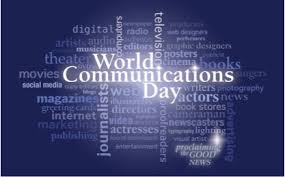In an age marked by disinformation and growing polarization, Pope Francis in his message for this year’s World Communications Day says journalists and communicators have a vital mission: to bring light, truth, and compassion into the public conversation.
The Pope begins by acknowledging the dangerous concentration of media power and the flood of misleading information shaping minds today.
Amid this crisis, he calls for a renewal of journalism that puts human dignity and communal responsibility at its core.
He encourages communicators to embrace the current Jubilee as an opportunity for grace and transformation, and to become true “communicators of hope,” grounded in the values of the Gospel.
The Pope warns against the dangers of “armed” communication—media that incites fear, division, and hatred rather than promoting understanding and peace.
He criticizes the use of communication as a weapon, noting how reality is often distorted for manipulation or gain. Modern digital platforms, driven by market logic, have led to a fragmented public consciousness, weakening social bonds.
This culture of hostility, where people are labeled and dismissed rather than heard and valued, Pope says undermines the foundation of hope.
Instead, he advocates for a communication style that fosters dialogue, empathy, and unity.
True hope, he explains, is not naive optimism. It requires courage, truthfulness, and endurance. Quoting thinkers like Georges Bernanos and Pope Benedict XVI, the Pope emphasizes that hope is an active virtue—transformative and life-giving.
In a world full of disillusionment and false promises, the Pope calls on communicators to anchor their work in the kind of hope that withstands adversity and inspires renewal. Such hope is deeply Christian, rooted in the presence of the risen Christ and sustained by the Holy Spirit.
Drawing from the First Letter of Peter, the Pope offers three key reflections for communicators. First, their hope must be rooted in Christ. Second, they must be ready to explain this hope to others—not through dogma, but through a way of life that invites curiosity and trust.
Finally, they must communicate “with gentleness and reverence,” like Jesus did. Communication, he insists, should be relational and heartfelt, making space for shared humanity and mutual respect.
In this way, Christian communicators can lead others to encounter truth and beauty in a fractured world.
The Pope dreams of a form of communication that encourages companionship, understanding, and collective action. It must resist the temptation to manipulate or provoke and instead focus on stories that inspire, heal, and uplift.
He stresses the importance of showing empathy and drawing attention to the hidden acts of kindness and resilience that reflect the presence of grace in daily life.
Communication should awaken the best in people, stir them to care, and help them discover their own role in building a more just and compassionate society.
Finally, the Pope highlights the communal nature of hope.
The Jubilee invites everyone to start anew and journey together toward renewal and mercy. Communicators play a crucial role in amplifying the voices of the poor, the excluded, and the suffering. He urges them to be gentle, thoughtful, and always guided by love.
By fostering a “culture of care” and telling stories that unite rather than divide, communicators can help reshape the future. With God’s grace, he concludes, they can be builders of bridges and authors of a shared, hope-filled tomorrow.
By, Sr Emmanuella Dakurah HHCJ (Sister communicator)












